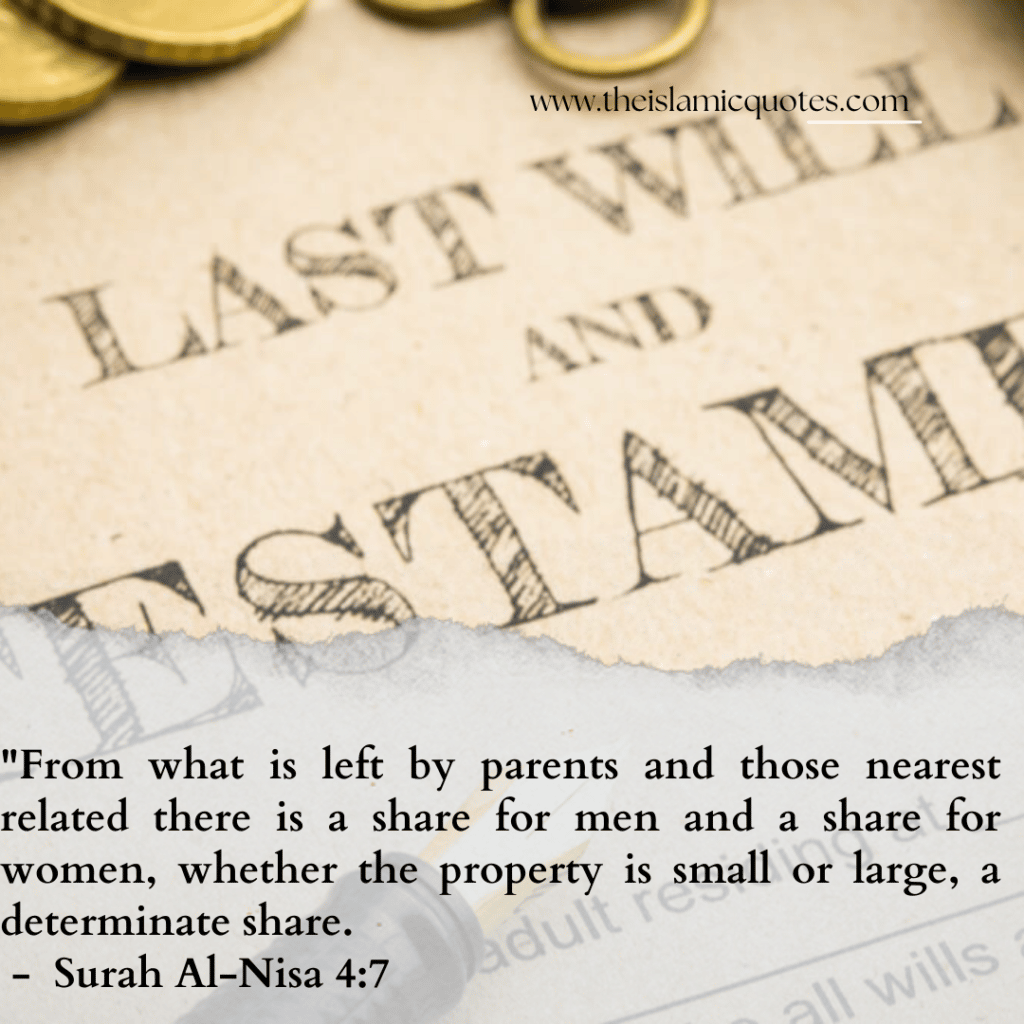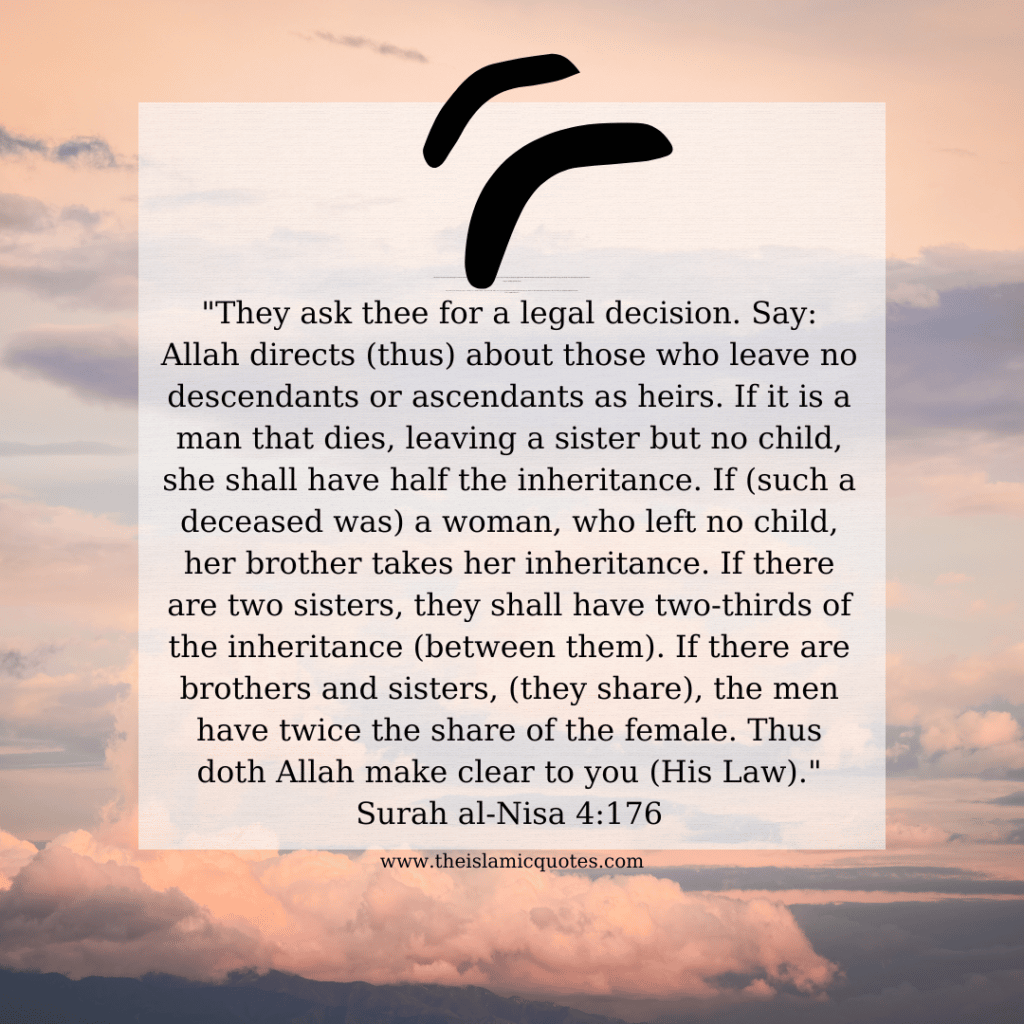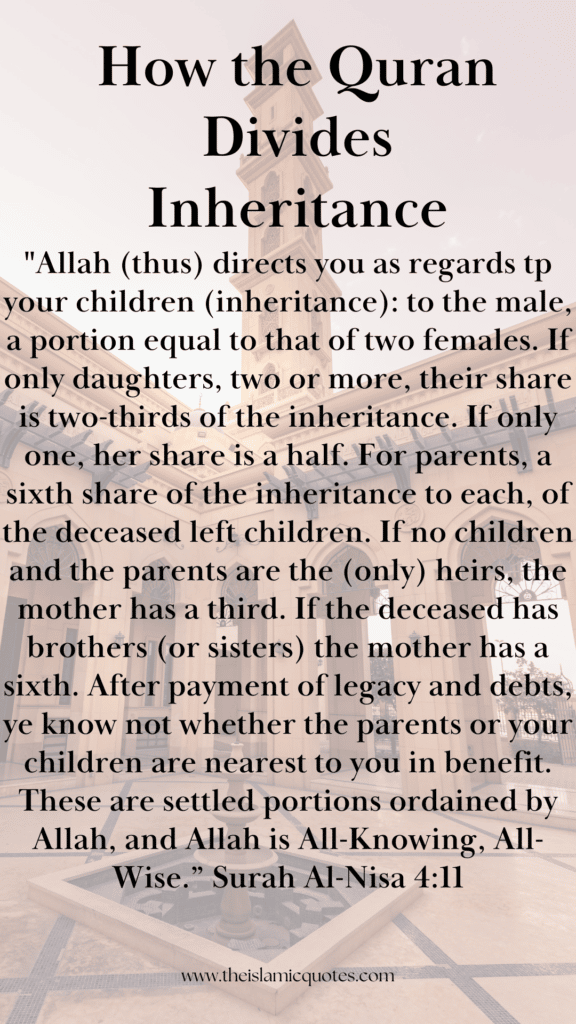Inheritance in Islam: In practically every area of life, including property rights, pre-Islamic Arab culture was male-dominated and did not favor women at all. Women had no legal claim to their father’s, husband’s, son’s, or brother’s property.
According to Arab belief, only those who can ride horses and engage in mortal combat would have a right to inheritance. By that point, it was evident that this concept benefited men over women regarding inheritance rights.
On the other hand, Islam recognizes the inheritance rights of women, men, and intersex legal heirs. The Holy Quran and the traditions of the Holy Prophet Muhammad (P.B.U.H.) make specific reference to the roles played by men and women in various relationships and situations in Islam, based on which the distribution of a decedent’s assets are outlined in the Holy Book.
What Does Islam Say About Inheritance
Islamic law specifies strict inheritance laws that govern how a Muslim’s wealth is distributed among his or her heirs after death. This rule limits the amount of the deceased’s net estate, which has been reduced by all obligations and burial costs, to one-third of that amount. Shari’a law is followed in dividing the remaining two-thirds.
1- Hadith on Inheritance
The following hadith on inheritance explains that it is the duty of fellow Muslims to help pay off the debt and take care of the dependents of the deceased Muslim.

2 – Inheritance in Quran
The verse from Surah Nisa from the Holy Quran lays down the rule that every legal heir shall receive their share in inheritance despite their gender and the size of the deceased’s estate.

3 – How to Calculate Inheritance in Islam?
Inheritance can be calculated as per the fractions provided in the Holy Quran. The following verse from Surah Nisa prescribes the share of various legal heirs.

4 – The Punishment for Denying Inheritance
Refusing someone else’s inheritance is considered a major sin and is known to manifest the wrath of the Almighty Allah (SWT). The following hadith states that even the most pious of humans shall be denied Jannah if they deny the inheritance of their rightful heirs.

5 – Islamic Inheritance Hanafi
Scholars base their argument against making a voluntary wasiyyah in favor of a person who is already getting a mandated share of this hadith. In other words, the wasiyyah cannot be used to increase the portions given to fixed heirs like daughters and husbands.

6 – Share of Illegitimate Children under Islamic Law of Inheritance Chart
The following tradition of the Holy Prophet Muhammad (P.B.U.H.), as narrated by Amr bin Shu’aib reveals that illegitimate children from adulterous relationships cannot inherit nor can be inherited from.
I would also recommend that you go through these Islamic Quotes on Corruption.

7 – How to Divide Inheritance in Islam?
The following verse from the Holy Quran lays down the division of shares for inheritance in a deceased Muslim’s estate. A son shall receive the share equal to two nearest female legal heirs present in the family. However, daughters of the deceased shall collectively receive 2/3rds of the estate.
However, if there is only one daughter and no son, then the daughter gets half the estate while the other half is divided among the rest of the legal heirs. These shares have been divided in a way that every legal heir is dealt with in a just manner.

8 – Wife’s Inheritance in Islam
The following hadith lays down the wife’s share in the inheritance in various scenarios. The Holy Quran has laid down very specific rules when it comes to inheritance to avoid confusion in all situations.

9 – Share of Sole Daughter in Islam
The hadith provided as under can be utilized and referred to when the deceased has only left sisters and daughters behind. If the deceased has one daughter and a sister as the only legal heirs then the estate shall be divided between them.
However, if there are two or more daughters and a sister then the former shall collectively receive 2/3rds of the estate while the remainder shall be inherited by the sister.

10 – Can anyone be disinherited in Islam?
Islamic law allows for the disinheritance of certain people. Two situations prevent a possible successor from receiving a set portion: first, when they abandon Islam, although they may still be given a share in the wasiyyah if they so choose; and second, when they kill the deceased.

11 – Hadith About Distribution of Shares
The following hadith narrated by Jabir bin Abdullah reveals the importance of distribution of shares and proves that the Quranic verses resolved a lot of anxiety for the believers regarding this issue. The Holy Quran, as elaborated in this post, lays down very specific fractions for each legal heir without leaving any room for ambiguity.

12 – How to Divide Shares in Islam?
In the following tradition of the Holy Prophet Muhammad (P.B.U.H.) reveals that once all the primary and secondary legal heirs have received their share, the remainder shall be divided among the next closest male relatives of the deceased.

13 – Inheritance in the Estate of Allah’s Apostle
The hadith below reveals that the property of Allah’s Apostle, who is Holy Prophet Muhammad (P.B.U.H.), cannot be inherited from. Only the wives and servants of the Holy Prophet Muhammad (P.B.U.H.) were entitled to inherit a share from His (P.B.U.H.) property while the rest was ought to be donated as charity.

15 – Depriving Others of Inherited Shares
As mentioned above, depriving the legal heirs of their rightful shares in inheritance is referred to as a major sin in Islam.

Frequently Asked Questions (FAQs)
Q. What is Islamic rule of inheritance?
Intestate succession is a requirement for inheritance under Islamic law. This indicates that the Qur’anic formula of specified shares is used to disperse a deceased person’s estate.
Q. How is inheritance shared in Islam?
According to the Quran, a male often receives twice as much as a woman. Daughters receive half of what sons do. If there are two or more daughters, each receives a part of the inheritance equal to 1/3. The widow receives one-eighth of the net inheritance when a man passes away leaving a wife and children.
Q. Is inheritance compulsory in Islam?
Yes, inheritance is compulsory in Islam in order to disperse the remaining wealth of the deceased in a just manner.
Q. How many Quranic heirs are there?
The Holy Quran has prescribed twelve (12) legal heirs.
Q. Who are the primary heirs?
Legitimate offspring and descendants are the main obligatory heirs, and they take priority over other compulsory heirs.







JazakAllahu Khairan
Asslam alikom, My mother passed away and we are 6 brothers and two sisters, and my father than engaged with another woman, and she has no children from my father and remains widow, would you let me know how much should she take from my father’s and grandfather’s property?
Asslam alikom, My mother passed away and we are 6 brothers and two sisters, and my father than engaged with another woman, and she has no children from my father and remains widow, would you let me know how much should she take from my father’s and grandfather’s property?